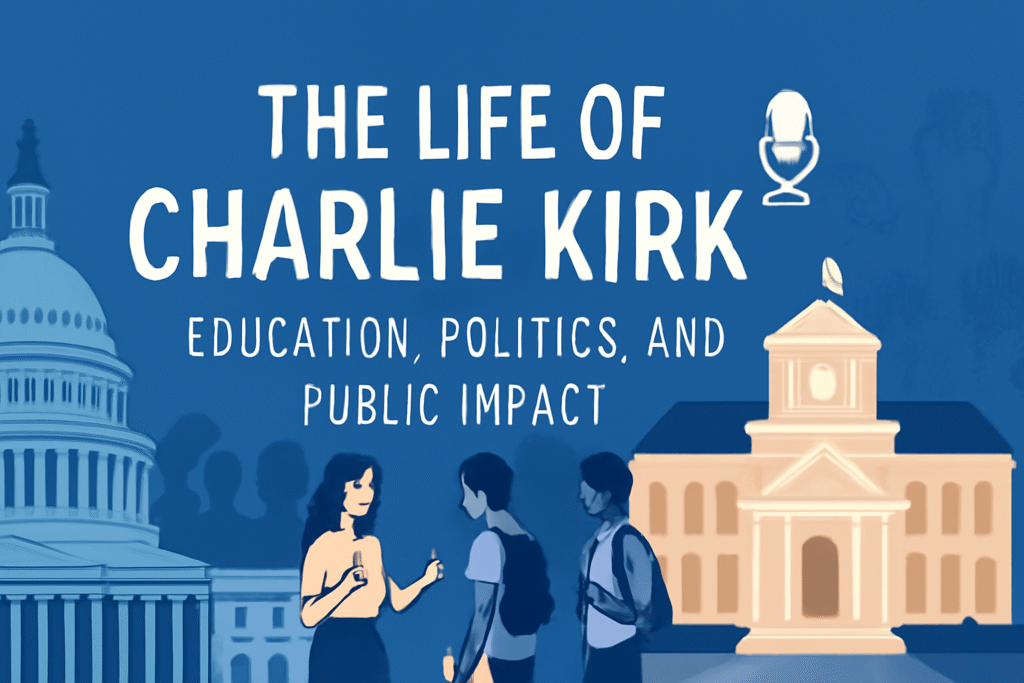
Charlie Kirk was a conservative activist and media figure who co‑founded Turning Point USA at age 18, built a sprawling youth-focused political network, authored best‑selling books, and later hosted a national talk show before being fatally shot while speaking at Utah Valley University in 2025.
His story spans unconventional education, combative politics, and measurable public impact on campus organizing and right‑leaning media ecosystems across the United States.
Early life
Charlie Kirk was born on October 14, 1993, in Arlington Heights, Illinois, and grew up in nearby Prospect Heights in the Chicago suburbs.
As a teenager at Wheeling High School, he volunteered for Illinois Republican Mark Kirk’s successful U.S. Senate campaign, a formative experience that pulled him into electoral politics early.
Kirk achieved the rank of Eagle Scout and gained first national attention after writing about perceived liberal bias in school textbooks, which led to a Fox Business appearance while he was still in high school.
Accounts of his adolescence often note his entrepreneurial streak on campus and his early preference for political activism over conventional extracurricular pathways.
Education
After graduating high school, Kirk briefly attended Harper College, a community college in Palatine, Illinois, before dropping out to pursue organizing full time, a decision that later became central to his public persona as a “college dropout” critic of higher education.
He later received an honorary doctorate from Liberty University in 2019, a symbolic credential that supporters highlighted as validation of his activism‑driven career path.
Founding Turning Point USA
Kirk met Tea Party organizer Bill Montgomery at a Benedictine University event; encouraged by Montgomery, he founded Turning Point USA (TPUSA) in 2012 as a youth‑oriented conservative nonprofit.
At the 2012 Republican National Convention he secured early donor backing from Wyoming investor Foster Friess, providing seed capital for TPUSA’s national growth.
Over the next decade, TPUSA developed into a multi‑platform organization with more than 800 campus chapters, leveraging events, digital media, and training to mobilize young conservatives.
Signature TPUSA initiatives included the Professor Watchlist and School Board Watchlist, which drew national attention and criticism by publishing names of educators the group said promoted left‑leaning ideologies, reflecting a confrontational approach to campus culture wars.
From TPUSA to an ecosystem
Kirk launched additional entities connected to TPUSA’s mission, including Turning Point Action (a 501(c)(4) advocacy arm) and Turning Point Faith to mobilize church communities, expanding the network beyond campuses into electoral and religious spaces.
Turning Point Action acquired Students for Trump in 2019 and attempted to recruit one million student voters for the 2020 Trump campaign, signaling the organization’s more overt role in electoral mobilization.
Financially, the TPUSA enterprise scaled rapidly; NPR reported approximately $100 million in 2024 organizational revenue, while Form 990 summaries show contributions of about $84 million for fiscal year 2024, underscoring robust donor support and national reach.
Media career
Kirk parlayed his campus profile into a national media presence, hosting The Charlie Kirk Show across Salem Media’s platforms with top‑tier podcast rankings and an expanding syndication footprint.
In March 2025, Salem announced a realignment moving Kirk into Dennis Prager’s long‑running time slot on many affiliate stations, reflecting his ascent within conservative talk radio.
The program mixed news commentary with live campus confrontations and audience Q&A clips that frequently went viral across social platforms, feeding TPUSA’s content pipeline and recruitment funnel.
Books and publishing
Kirk’s most widely known title is The MAGA Doctrine, a New York Times bestseller published by HarperCollins that frames Trump‑era populism as an answer to “Big” institutions from media to tech and higher education.
The book extended his messaging beyond students to a broader conservative readership, and it remains a staple reference for those tracing his ideological arguments in print.
Alliance with Trump
Kirk became one of Donald Trump’s most visible young allies, cultivating direct ties to Trump world and frequently amplifying the former president’s messaging to a Gen Z and Millennial audience.
Major outlets portrayed him as instrumental to energizing youth support in key cycles, with his groups running bus tours, campus town halls, and online drives that integrated on‑the‑ground activism with content operations.
Positions, messaging, and critique
Supporters saw Kirk as a champion of small government, free markets, and an assertive cultural conservatism animated by Christian nationalist themes in his later years.
Critics, including watchdog groups and academics, argued he blurred lines between mainstream conservatism and conspiratorial rhetoric, especially on COVID‑19, the 2020 election, and demographic politics, charges reflected in fact‑checking archives and scholarly analysis.
A prominent fact‑check in 2022 rejected the claim that TPUSA is a “white nationalist” organization, noting the group’s record of cutting ties with overt white supremacists even as it leverages polarizing racial narratives for mobilization.
2020 election activity
After the 2020 vote, Kirk disputed the results and promoted “Stop the Steal” activism; Turning Point Action ultimately sent several buses of supporters to the January 6 rally while stating it neither organized nor joined the Capitol march, a posture that drew scrutiny and later testimony to congressional investigators.
Kirk later deleted a tweet boasting of sending more than 80 buses, and the organization condemned political violence while acknowledging participation in rally logistics for allies and speakers, highlighting the blurred boundary between issue advocacy and campaign‑adjacent mobilization.
Organizational finances and scale
Public tax filings and nonprofit trackers show TPUSA’s contributions rising from under $1 million in 2013 to more than $80 million by fiscal year 2024, charting one of the fastest donor‑funded growth trajectories among youth political nonprofits.
Compensation disclosures list Kirk’s salary rising with the organization’s scale, a common pattern in large U.S. nonprofits, and filings detail increasing staff, program expenses, and assets consistent with national operations.
COVID‑19 and misinformation debates
Kirk faced repeated criticism for promoting misleading claims about public health during the pandemic, including statements on hydroxychloroquine and mask mandates that resulted in temporary social media enforcement actions and intensified media scrutiny.
These episodes strengthened detractors’ arguments that his communication style rewarded outrage and virality over accuracy, while fans framed it as spirited dissent against overreaching institutions, illustrating the polarization underpinning his influence.
Faith outreach and Christian nationalism
Beginning in 2021, Kirk codified church mobilization into Turning Point Faith, arguing that civic liberty depends on Christian moral foundations and calling for pastors to lean into voter engagement on social issues.
Scholars and journalists interpreted this turn as part of a broader embrace of Christian nationalism, shifting Kirk from earlier more secular campus rhetoric into a theologically inflected politics aimed at pulpit networks and religious media.
Death and national reaction
On September 10, 2025, Kirk was shot while speaking at Utah Valley University during a Turning Point event and later died at a local hospital, prompting tributes from supporters and widespread condemnation of political violence from national leaders and media across the spectrum.
Coverage chronicled both his rapid rise from teenage organizer to a pivotal voice in youth conservatism and the shock of a high‑profile assassination during a campus appearance that symbolized his favored battlegrounds.
Public impact
Turning Point USA professionalized right‑of‑center student organizing, building repeatable formats—chapters, mega‑events, bus tours, and influencer pipelines—that reshaped how the GOP courts younger voters.
Academics studying digital politics describe Kirk’s formula as translating campus conflict into scalable content and activist training, accelerating conservative movement recruitment and attention economics on TikTok, X, and podcasts.
Whether praised as an entrepreneurial builder or criticized as a misinformation amplifier, Kirk left an indelible mark on youth political infrastructure and the media strategies that now define it.
Timeline at a glance
- 2012: Founds Turning Point USA after meeting Bill Montgomery and securing support from donor Foster Friess at the Republican National Convention.
- 2016–2020: Expands TPUSA, addresses the RNC, publishes books, and becomes a prominent surrogate in Trump‑aligned media ecosystems.
- 2019–2021: Launches Turning Point Action and Turning Point Faith to enter advocacy and church mobilization alongside campus work.
- 2020–2024: Hosts a nationally syndicated radio show and top‑downloaded podcast with Salem Media while TPUSA revenues and chapters surge.
- 2025: Killed in a shooting at Utah Valley University while speaking on a multi‑campus tour, triggering a national conversation on political violence and his legacy.
Frequently asked questions
Who was Charlie Kirk?
Kirk was an American conservative activist, author, and media host who co‑founded Turning Point USA in 2012 and became one of the most prominent youth‑focused figures on the political right.
What was his educational background?
He attended Harper College briefly and left to build TPUSA, later receiving an honorary doctorate from Liberty University in recognition of his activism.
What is Turning Point USA?
Turning Point USA is a donor‑funded nonprofit that organizes conservative students through chapters, events, and media, and by 2024 reported operations across more than 800 campuses and significant annual revenues.
How did he build his media brand?
Kirk hosted The Charlie Kirk Show on Salem’s radio and podcast networks, consistently ranking among high‑performing news podcasts and expanding to additional talk‑radio slots in 2025.
Which books did he write?
His best‑known title is The MAGA Doctrine from HarperCollins, which became a New York Times bestseller and summarized his case for Trump‑era populism.
How close was he to Donald Trump?
Major outlets chronicled Kirk’s direct line to Trump world and his organizations’ role in mobilizing youth voters for Trump‑aligned campaigns, making him a key surrogate and movement organizer.
Why was he controversial?
Researchers and fact‑checkers criticized Kirk’s rhetoric on COVID‑19, the 2020 election, and race, while supporters saw him as a forceful advocate countering liberal dominance on campuses, and a 2022 ruling rejected labeling TPUSA as a white nationalist group.
What role did he play in the events around January 6, 2021?
Turning Point Action promoted travel to the Washington rally and funded speakers while stating it did not organize or join the march to the Capitol, later drawing congressional scrutiny and internal reassessments of the judgment shown.
How large was the organization financially?
IRS‑linked summaries show TPUSA’s contributions climbing to roughly $84 million in fiscal 2024, while reporting from NPR placed the broader network’s annual revenue near the $100 million mark that year, illustrating rapid donor growth.
How did he die?
Kirk was shot while speaking at Utah Valley University on September 10, 2025, and died at a nearby hospital the same day, with national leaders and media condemning the attack and noting his outsized imprint on youth conservatism.
What is his legacy?
He professionalized conservative campus organizing and fused it with social video, talk radio, and influencer politics, creating a template many on the right now emulate and many on the left study to understand modern mobilization dynamics.


